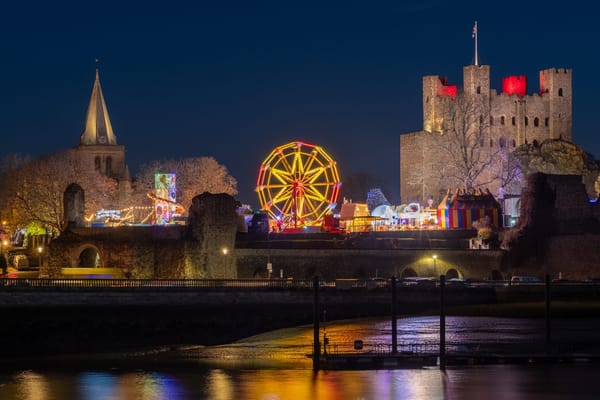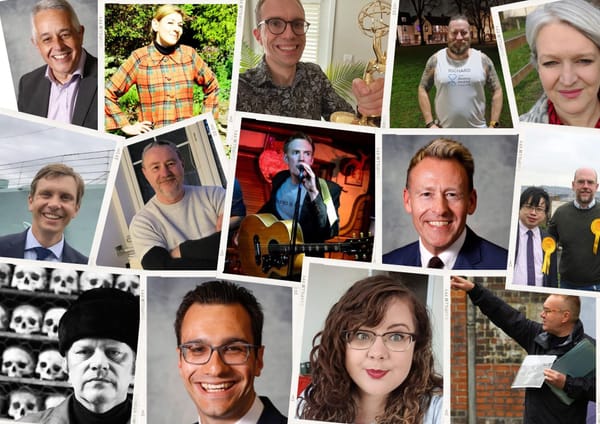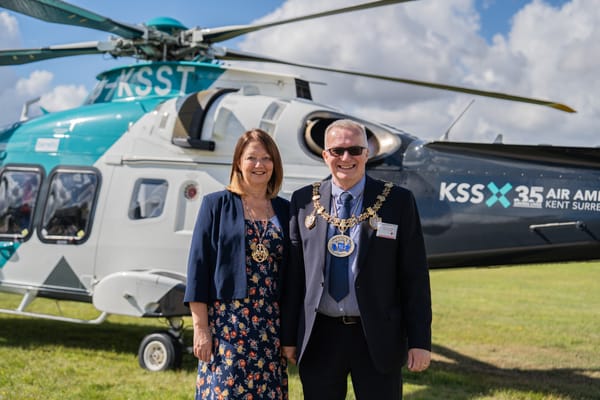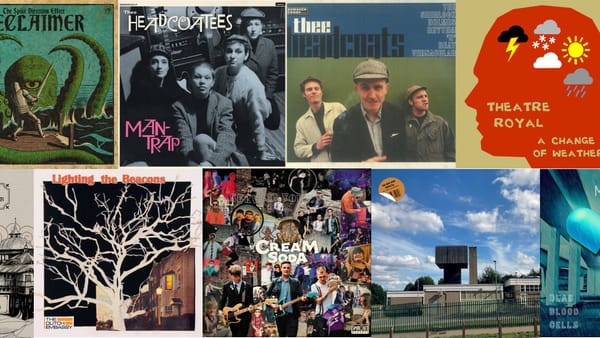“We suffered as a result of the coalition and it's taken time to build up”
What Steven asked Stuart Bourne, Nicholas Chan, and Graham Colley, the Liberal Democrats' General Election candidates for Medway
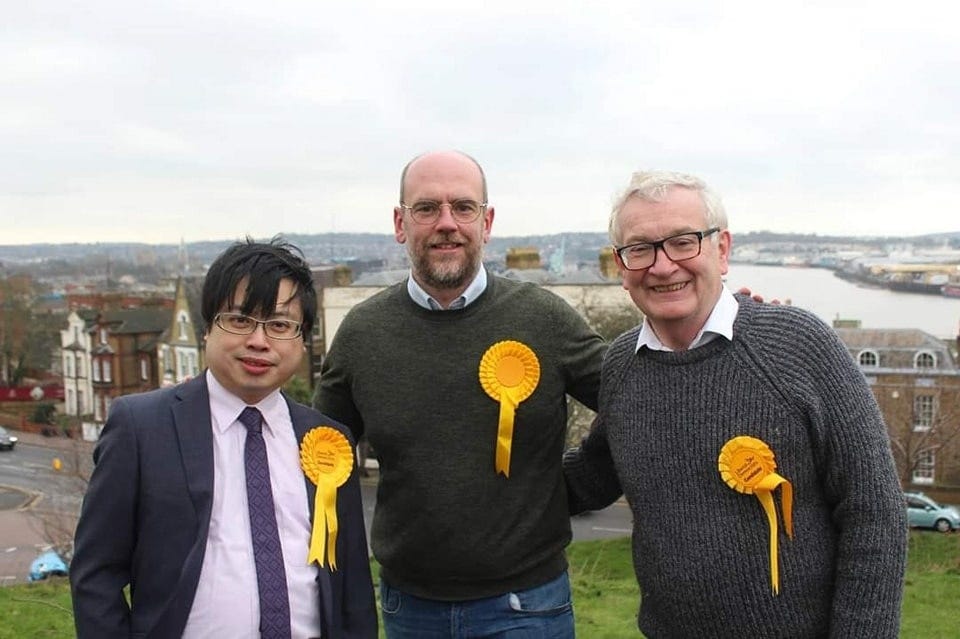
With the General Election imminent, this is the second in a series of sit-down interviews with General Election candidates from the smaller parties. Steven met all three Liberal Democrat candidates for Medway’s constituencies: Stuart Bourne for Gillingham and Rainham, Graham Colley for Rochester and Strood, and Nicholas Chan for Chatham and Aylesford. In the coming weeks, we’ll have a similar piece with the Green Party.

Where were you born?
Nicholas Chan: In Hong Kong.
And what brought you to the Medway Towns?
NC: When I came with my wife to the UK, the Medway Towns was one of the places that was on our radar because it is near to the places that we work, and it is a fabulous town to work. You get to travel to London very easily. There's opportunities here in the Medway Towns.
Stuart Bourne: I was born in All Saints Hospital right in the centre of Chatham, and I grew up in Lordswood.
And were your parents from Medway?
SB: Yeah, they've been around. I did some digging, and I think my dad's side came over from Brighton in the 1920s. My great-grandfather was a World War One veteran and became a tailor and then set up a business here in Medway. My mum's family actually goes back further and it goes a bit murky, so it's a proper classic Medway family that their past suddenly disappears, but I think they're at least five generations.
Graham Colley: I was born in Nottingham, although going on from what Stuart said, my parents met on the steps of All Saints Hospital in the late 1940s, so it's full circle. I was working in West Malling and then eventually gravitated to Medway.
What jobs did your parents do growing up?
NC: My mother was serving with the British government in the High Commission in Singapore and in various countries. That's why I actually grew up in various places around the world.
SB: My dad was an apprentice at the Chatham Dockyard, and then he moved on to non-destructive testing, which is a very fancy way of saying he took radar images of welds and pipes to test for depth and he worked on a lot of power stations that took us up to Lancaster, Dungeness and they even took him to Holland and Germany when their work dried up in the early 90s under the Tory economic plan. My mum was a housewife, but she did have to do a few odd jobs when my dad was low on wages. I think she worked on a mushroom farm for one period, she was a dinner lady, those sorts of jobs.
GC: Both my parents were GPs. They had a practice together, but as I said earlier, they met on the steps of All Saints Hospital because my dad was doing his national service in the dockyard, and my mum was doing her midwifery training at All Saints.
How did you find school?
SB: School was a difficult period. I went to Chatham Grammar, and I didn't quite fit in. I think it was because I didn't really know what I wanted to be. I left school at 16 and went straight to MidKent College to study engineering, and I enjoyed that much more because there was passion for the subject.
GC: I was indifferent to it. I wouldn't say it was the happiest days of my life, but I wouldn't say I was unhappy there. I had some good friends there.
NC: I loved school. I think it is very important to have a child to have a good start in life and education is a very important and fundamental part.
Where did you attend school?
NC: In Hong Kong, Singapore and Australia.
Where did you go to university, and what did you specialise in?
NC: Psychology and then Forensic Psychology at the University of Westminster in Perth. Very laid-back city, and that’s why you can concentrate (laughs).
What is Forensic Psychology?
It's to do with criminal psychology. You work with the public health service as well as the public prosecution in a range of things from profiling to rehabilitation and law and order.
SB: I then did a degree in Electronic Engineering at Greenwich University, down at the old dockyard.
GC: I went to the University College of Wales, now the University of Aberystwyth. I studied Law there. I really enjoyed university, and then I went on to the College of Europe in Brugge.
What political parties have you been a member of?
GC: When I was at university, I joined all the parties there, including Plaid Cymru, but not the Communist Party. The Liberal Party was my family party, they were very active over generations. Geraint Howells, who was the candidate in Aberystwyth, recruited me to help him win the election where he first became a Liberal MP.
NC: Liberal Democrats. I have served under an MP in the Liberal Party of Australia, but I was not a member of the Liberal Party.
What led to you joining the Liberal Democrats?
NC: It was a progressive party with liberal values and a global outreach.
SB: I have also been a member of the Labour Party from the age of 16. My parents, from a traditional working-class background, were Labour supporters and it felt comfortable for me to be a member of that party.
What led to you leaving the Labour Party?
SB: There were many things, some of them really silly things, like I couldn't say comrade without smirking a little bit. Ultimately, it was the fact that their direction moved away from the centrist policies that I felt comfortable with. Under Corbyn, it just didn’t feel right. Now I've joined the Liberal Democrats, it feels like this has always been my home, and I feel like the actual values that I thought were part of being Labour are actually my Liberal Democrat values.
When did your name first appear on a ballot?
SB: In 2007 when I stood as a Labour Party councillor in Princess Park.
How did you do?
SB: I was 50 votes short. Yeah, no regrets.
NC: This election is my first Westminster election.
Why have you decided to stand?
NC: I wanted to be in parliament to make a change for politics, especially in social justice, and the care plan would be something of my priority. This is something that I really would like to serve the community.
And why have you decided to stand in this election?
NC: I needed to stand because I've always had the need to serve my community. The need to be helping and supporting people as best as I can, and I feel like there needs to be a Liberal Democrat voice.
GC: Oh, I think it was about 1985. I stood in Walderslade. I didn't win that and then I was the parliamentary candidate for Mid Kent shortly after that.
And why have you decided to stand in this general election?
GC: Because I think liberals and Liberal Democrats have very, very important points to make and say. The other two parties often seem to be too close together. We have an alternative view that people, once they understand it, I think would support.
What was your first full-time job?
NC: I was working in the audit department. That was a full-time job while I was still in university. My first full-time job after university was as a trained psychologist.
GC: I did some very interesting holiday jobs when I was a student, including working in a geriatric hospital and working in a steelworks. But my first full-time job was what was then called an article clerk in a solicitor's office, now called a trainee solicitor.
SB: My first full-time job was the Ministry of Defence on a scientific graduate programme. After I graduated and spent two years in that programme, where I travelled around spending six-month periods across all the Ministry of Defence departments and then ended up eventually working in central London.
Normally I then get told, I can't tell you anymore because I've signed various NDAs.
SB: Yeah, literally, not even my wife knows what I'm talking about.
What is your official occupation now?
NC: I'm training in law right now as a trainee auditor, mainly in criminal law practice.
SB: I'm a professional gardener now.
GC: I'm a solicitor and independent financial advisor. I've got both qualifications, and I practice in Medway.
Other than your job and standing as a candidate, do you have any other additional roles, paid or unpaid?
NC: I have a family business which is still in Singapore. We have, for generations, worked as a textile manufacturer. That is something carried on in the family and I'm very fond of.
SB: I'm a school governor for Riverside Primary School, and I'm a trustee at my local church charity.
GC: I was, for many years, the chair of a mediation charity. I am now the president of Lib Dem lawyers, otherwise called Rights, Liberties, Justice, that fights for human rights, access to justice, and civil liberties.
Where do you like to go for dinner in Medway?
NC: Various places. The Greedy Banker, and there's a restaurant in Strood that I always go to for Chinese takeaways called Water Lily.
SB: We're a big fan of Greedy Banker. We got used to those burgers in lockdown when it was The Dead Pigeon over in Rochester and collecting them. We're also very excited about Wagamama opening.
GC: I think there are a number of good restaurants on Rochester High Street. I'm not going to take a pick of them.
Who has been the best Prime Minister of your lifetime?
SB: I'm gonna have to say Tony Blair. I was a member of the Labour Party during his years, and he was the reason why I campaigned and supported him. I have to say, looking back at myself, I think there was a little juvenile naivety about the whole affair, even though he was the most transformative Prime Minster we've had compared to what we've achieved since then. There were some sort of dark issues on there that I even now I think I can’t believe I defended those.
GC: I'm of an age where I can actually say it was Winston Churchill. And, of course, at one point, he was a Liberal, and when he was a Liberal, he was behind some very reforming policies that brought in the beginnings of the welfare state. After that, of course, it's very difficult because there's been no Liberal Prime Minister since all of us have been around. But perhaps I would give credit to Harry Wilson because he did stand up to the Americans and he prevented Britain getting involved in the Vietnam War.
NC: (pauses) I would like to say that the Prime Minister is actually the chair of the party in our British system. So, it will more be the party that...
Yep, the question is... Of the people that have been Prime Minister...
NC: I have to say that I was actually very fond of the coalition years, which I'm proud of.
Okay, so you're saying David Cameron is the best Prime Minister?
NC: I'm proud of my party supporting David Cameron as Prime Minister in the coalition years.
And that made him a good one.
NC: We made him a good one.
As you’ve brought it up, if the election was to end up with a hung parliament, would you support the Lib Dems going into coalition with the Conservatives?

